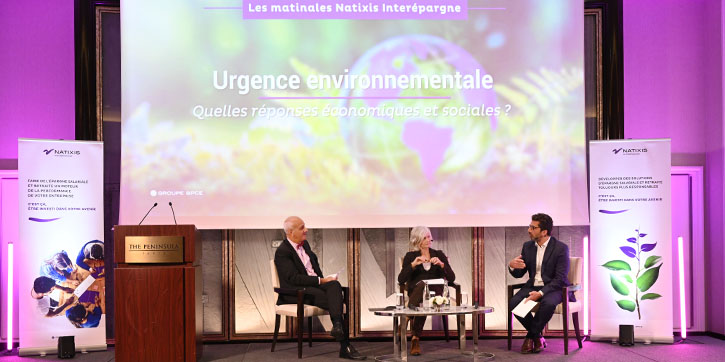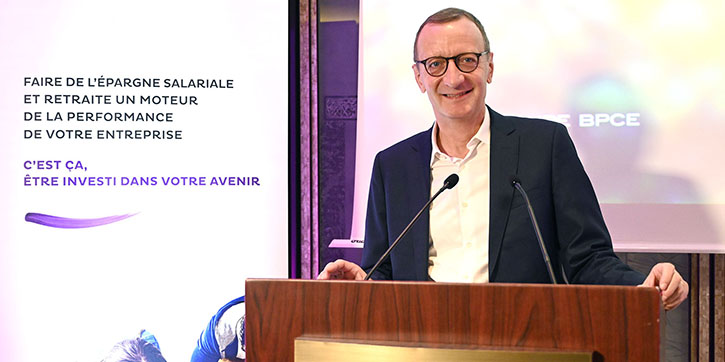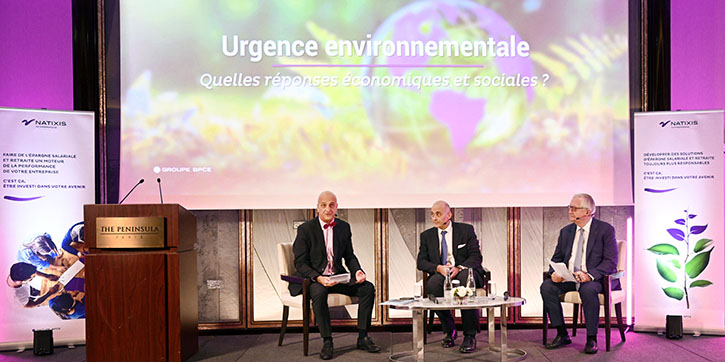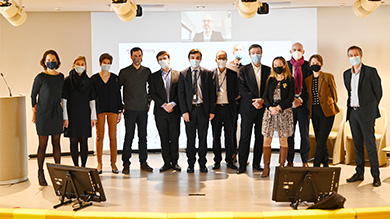How can we answer climate change issues and drive economic, industrial, and social commitments to address them? During the webinar Les Matinales of Natixis Interépargne, which took place on 21st October 2021, many well-known experts tackled these topics: Patrick Artus, Economic Advisor at Natixis, Thomas-Olivier Léautier, Director of Université Groupe du Management and EDF Chief Economist, Geneviève Férone Creuzet, Associate and Co-Founder at Prophil, and Hervé Guez, CIO Equity & Fixed Income at Mirova. Discover the key insights and the whole replay of this conference.
WATCH THE REPLAY
(IN FRENCH ONLY)
Climate change: how can we decarbonize energies?
The 6th report from the IPCC (Intergovernmental Panel on Climate Change) released last August, states that global warming is happening faster than expected. The global temperature is set to increase by 1.5°C by 2030 – ten years earlier than their last projection. The climate crisis is a reality we can no longer ignore. This topic will be at the heart of the COP26 discussions, held in Glasgow. In the face of the environmental crisis, the importance of decarbonizing the economy and in particular the energy sector, has become urgent.
According to Thomas-Olivier Léautier, EDF Chief Economist, this transition will happen in two stages: “First of all, we need to reduce our consumption, then implement electricity in our everyday activities.” By 2050, energy demand will be three times higher - at the great expense of the states. Indeed, the IMF (International Monetary Fund) and the IEA (International Energy Agency) assessed that reaching zero carbon emissions will require additional global investments from 0.6% up to 1% of the global annual GDP over the course of the next two decades. Meaning the estimated overall cost could be up to 20,000 billion dollars. To do so, the financial investments must be redirected towards low carbon energy.
As well as this, fossil fuels will become more expensive as oil producers will be gradually reducing their investments between now and 2050. Undoubtedly, the scarcity of supply will trigger an increase in value. “It’s a good thing for the planet but the citizens will carry the burden of the cost.” comments Patrick Artus, Economic Advisor at Natixis. He believes that supporting low-income households is crucial in this scenario, where long-term investments in green energies are less profitable than fuels. However, that’s the price to pay to promote low-carbon and renewable energies like hydrogen, which requires a great deal of financing to insure its production, storage, and distribution.
Rethinking the model of finance: wellness as a new measure
Decarbonizing the economy will lead to a loss of capital and will take a hard hit on states’ GDPs. This is because investing in green energy will be less profitable than investing in fuels. The traditional model of finance is shaken by new constraints and extra-financial sustainable externalities such as the ESG (Environmental, Social and Governance) criteria.
“Professionals are reluctant to adapt to this new approach to finance. Until now, performance has been the driving force. It is a deep-rooted culture inherited from decades of risk/return ratio within the financial sector.” analyses Geneviève Férone Creuzet, Associate and Co-Founder at Prophil. Raising the awareness of companies, investors and clients is crucial: “Pressure comes from all sides: from savers just as much as from the states and the regulators.” adds Hervé Guez, CIO Equity & Fixed Income at Mirova. This sustainable approach requires more transparency in the green investments, citizens’ trust in states’ directives and more qualitative and precise ESG data to justify the impact of the investments. “It is a top priority: when asset managers receive ESG data, there is a discrepancy between countries due to cultural bias. Governance plays a leading role in changing mentalities. It is the human aspect we are talking about. Let’s not forget that’s the most challenging part.” highlights Geneviève Férone Creuzet.
Finance is beginning to keep pace with the climate crisis but it needs to speed up. More and more companies are willing to define their mission statement to closely manage their social impact, resources, and sustainable values. “Future investments will no longer be measured solely on their GDP or ROI but also on external factors: we are entering a new economic era based on wellness.” predicts Patrick Artus.
Employee and retirement savings - boosting the transition
Employee and retirement savings can also play a key role in supporting the transition by directing investments towards a sustainable approach. It is an opportunity for companies and their employees, who care about climate issues. Indeed, employee savings is a means for climate-conscious consumers and citizens to invest in sustainable projects. It is a vehicle for social cohesion and pride and has become an obligation. Employee and retirement savings which don’t embody ESG criteria will be cast aside. Christophe Eglizeau, General Director of Natixis Interépargne shares this point of view: “Savings help companies in driving their transition to address climate issues.”
Compared to institutional investors and pension funds, companies are falling behind and need to provide more information and transparency. “If the HR departments implement their mission statement into the profit-sharing and incentives plans, it can be an engaging, social and attractive bonus.” explains Hervé Guez, CIO Equity & Fixed Income at Mirova.
The new European “Sustainable Finance Disclosure Regulation” (SFDR) has a powerful levering effect urging asset managers to conceive green offers, which include sustainable goals, to boost the energy transition investments. Thus, public investments and savings are also reliable economic vehicles to finance the energy transition.

















